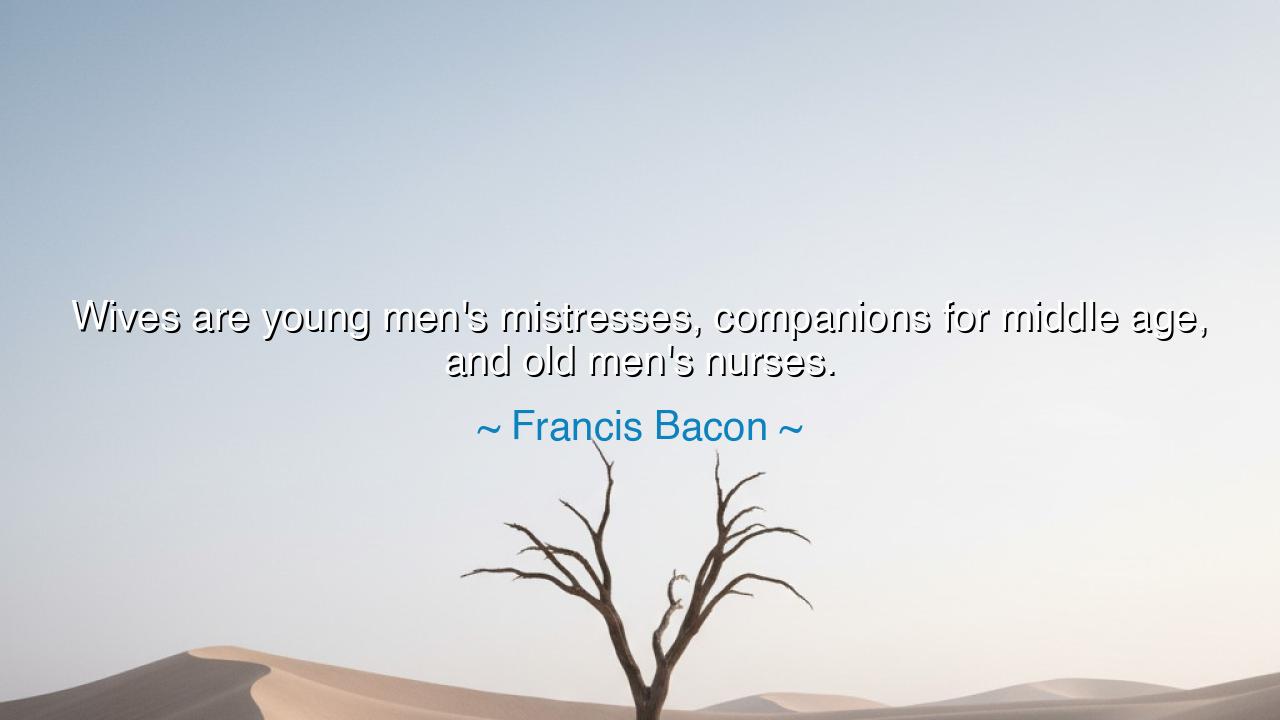
Wives are young men's mistresses, companions for middle age, and






In the grand theater of life, there are few relationships more fraught with complexity, depth, and eternal significance than that of husband and wife. The great philosopher and statesman, Francis Bacon, once shared his profound observation: "Wives are young men's mistresses, companions for middle age, and old men's nurses." This statement, though succinct, is laden with deep wisdom, as it distills the evolving role of a wife across the seasons of a man’s life. In these words, Bacon reveals both the romantic and practical dimensions of this sacred bond, and in so doing, he offers a timeless reflection on the human condition.
To understand this, we must first grasp the idea of the mistress. When youth is upon a man, his desires are often impetuous, fiery, and filled with passion. At this stage, the wife is the object of his desire, his mistress, a companion to indulge in the intoxicating pleasures of the body and soul. This is the time of infatuation, of seeking out the thrill of new love, when the heart races and the mind is consumed by romance. The early years of a marriage are often marked by this fervor, as two young souls intertwine in a passionate union, basking in the joy of companionship.
But as the years unfold and the man enters the prime of his life, a shift occurs. The mistress becomes something more—she is now the companion, the trusted partner in the journey of middle age. This is the time when the thrill of youthful passion gives way to the more steady rhythms of life. The bond deepens, and the wife becomes not only a source of comfort but of wisdom and strength. She is the one who walks beside him through the trials and triumphs of life, offering counsel, understanding, and loyalty. It is in these years that the true meaning of companionship reveals itself, for this is a partnership forged not only in the fires of passion but in the steady warmth of mutual respect and shared experience.
Consider the example of the great Cleopatra, who was both the mistress and companion to the mighty Julius Caesar. In their early days, their relationship was marked by intense passion and political intrigue, a union driven by desire and ambition. But as time passed, their connection evolved into something deeper. Cleopatra was not just a lover, but a trusted partner and ally, a figure of strength beside Caesar as he navigated the complex world of Roman politics. Theirs was a marriage that, in many ways, exemplified Bacon’s notion of the wife as a companion—a woman whose intelligence, character, and presence transcended the mere physical and transformed into a mature partnership.
And as the years inevitably flow onward, so too does the role of the wife. In the twilight of a man’s years, when the vigor of youth has ebbed away and the energies of middle age begin to wane, the wife takes on yet another role—she becomes the nurse, the caretaker, the one who sustains him in his decline. It is a role that is both tender and tragic, for in this phase, the once fiery passion of youth has long since softened into the gentle nurturing of one who cares for the physical and emotional needs of her aging spouse. Bacon paints this image with an understanding of the inevitable passage of time, where love takes on new forms, and where devotion is expressed through acts of care rather than the exuberance of youthful delight.
There is a profound dignity in this role of the nurse, for it is a form of sacrifice that speaks to the depths of human connection. Think of the story of Queen Victoria and her beloved Prince Albert. When Albert’s health began to fail, it was Victoria who stood steadfast by his side, nursing him through his illness and sorrow. Though their early years had been marked by passionate love, their later years were defined by devotion and care. Victoria’s role as a nurse to Albert in his final years was not a sign of weakness, but a testament to the endurance of love—a love that endures not only in the good times but also in the moments of fragility and suffering.
Thus, from the first blush of youthful passion to the final moments of tender care, Bacon’s words remind us that the relationship between husband and wife is a journey, one that is meant to evolve and deepen with time. The wife, in all her roles, is both a reflection of and a partner in the man’s own life, helping him navigate the various stages of his existence. She is not merely an object of passion or a caregiver but a dynamic force that shapes the man’s life, his identity, and his soul.
The lesson here is not merely one of romantic love but of commitment, adaptability, and growth. As we journey through life, may we embrace the changing roles of our relationships with the same grace that Bacon describes. Let us remember that love is not a static thing but an evolving bond, capable of adapting to the rhythms of life’s many stages. Whether we are at the height of passion, in the midst of companionship, or in the quiet moments of care, let us approach each phase with the deep understanding that these roles are all part of the great tapestry of love and devotion. And in doing so, we shall find that the deepest connections are those that withstand the tests of time.






AAdministratorAdministrator
Welcome, honored guests. Please leave a comment, we will respond soon